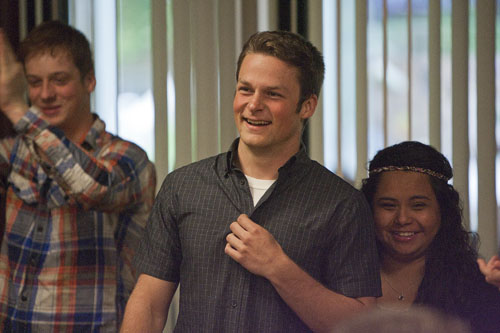Harris Foster and Yesenia Silvia-Hernandez were elected as student body president and vice president, respectively. The pair garnered 287 votes, or 50 percent of the votes cast. A new constitution, proposed by former Vice President Ethan Allen Smith, failed, with 47 percent voting against it, 28 percent voting in favor and 25 percent abstaining. The 569 votes cast in the ASPSU election represent a 3 percent voter turnout, down from last year’s 9.3 percent turnout, which one expert called “terrible.”
Foster-Hernandez ticket wins, new constitution fails

The results of the Associated Students of Portland State University elections are in, and while the victors are happy, the voter turnout of 569 people has the election’s organizers disappointed and looking for solutions.
Harris Foster and Yesenia Silva-Hernandez were elected as student body president and vice president, respectively. The pair garnered 287 votes, or 50 percent of the votes cast.
A new constitution proposed by former Vice President Ethan Allen Smith failed, with 47 percent voting against it, 28 percent voting in favor and 25 percent abstaining.
Candidates responded to the news after the results were announced in the Smith Memorial Student Union today.
“I will not fail you,” a visibly overwhelmed Foster said. He thanked his campaign team and reiterated promises to rework PSU’s contract with Higher One and to set up a good Samaritan program that would allow students to call for emergency services in cases of drug overdose without the risk of criminal charges.
“We are going to make these promises happen,” Foster said.
Hernandez issued a call for input from students, asking what they want from their school government.
“Bring it on. We are ready to work,” Silva-Hernandez said.
Write-in candidates Heber Miguel and Landru Parker, who campaigned for six days, received 100 votes (17.5 percent), and James Au and Jay Phung came in third with 89 votes (16 percent).
Miguel expressed pride in his marketing team and wished Harris’ team good luck in the next year, adding that he plans to continue to work to improve PSU’s community by working with organizations outside ASPSU.
Au also plans to stay involved on campus. In keeping with the respectful tone of this year’s race, Au said he enjoyed his interactions with Foster and Miguel. “That’s OK,” Au said of the loss. “I had a good experience.”
Proposed new constitution fails
Smith expressed disappointment at the rejection of what he called “the students’ constitution.
“There are so many institutional and bureaucratic problems within ASPSU, and no effort within student government to fix those problems,” he said.
“That 97 percent of the student body chose not to vote says more about ASPSU than the constitution,” Smith said. He also attributed the low voter turnout to students’ belief that ASPSU has no influence over the issues that are important to the student body.
The judicial review board, which organized the elections for the first time this year, disagreed with Smith. Chief Justice Emily Kunkel cited drastic changes in election organization that went into effect this year as the cause of the low voter turnout.
“Everyone’s comparing voter turnout to last year. Last year the elections board was five people whose only job was elections,” she said. Voter turnout last year was 2,731 people, or 10.5 percent of the full-time equivalent enrollment at PSU.
This year, Kunkel said, the work was given to the judicial board, which faced obstacles such as fluctuating membership and lack of participation from justices as well as tense relations with the senate and the executive branch. The fact that the JRB and the senate often have conflicting views made working together on elections difficult, Kunkel said.
Justice Ryan Day said the work presented a conflict of interest.
“The judicial board should not be doing elections work,” Day said.
However, the JRB acknowledged that there were many reasons turnout was so poor.
“All around, we just fell short,” Kunkel said. Tom Worth, ASPSU university affairs director and senate liaison to the JRB, called the low turnout “unfortunate.”
It was a result of the “inherent difficulties in enacting a new constitution. All we can do is pick up and move on and do better next year,” Worth said.
Worth hopes that many of these growing pains will be eased by the amendments that were passed, one of which will require the JRB to have an elections plan in place by the end of November.
Worth was also pleased with the rejection of Smith’s constitution, saying it was better to amend the existing constitution than create a new one. “We don’t abandon our national constitution every time there’s something we don’t like. We offer up amendments,” he said.
Seven students were elected to the student fee committee: Krystine McCants, Marlon Holmes, Soledad Hernandez, Tia Gomez-Zeller, Melinda Guillen, Jonathan McEntee, and Kismet Kilbourn.
McCants and Guillen both have a goal to make sure students know where their funds are going.
“As an SFC member, it’s my job to educate,” Guillen said. McCants hopes to increase students’ access to the internal workings of the SFC by creating an “institutional memory”—a record students can access to see a history of the programs the SFC has funded. The SFC chair will be chosen by the complete committee, likely at its first meeting, said ASPSU Communications Director Anthony Stine.
The referendum asking students if they would like the senate to dedicate the student building fee to the renovation or reconstruction of Smith Memorial Student Union passed, with 58 percent of voters approving. All 15 candidates for senate were elected as there were 15 open spots. More detailed elections results can be found at the ASPSU website at aspsu.pdx.edu.







It’s a little late to be looking for solutions after the votes are in… Having 1/4 the turn out from a year ago is bad and they should feel bad.
By looking for solutions they mean that they are looking to implementing solutions for next year. Boo-hooing the results and turnout will accomplish nothing. Feeling bad will fix nothing.